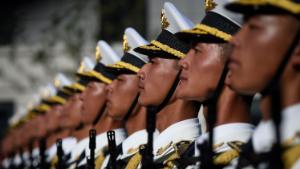China's defense budget shows Xi's priorities as economy tightens
When China announced a 6.6% increase in its military budget last week while cutting substantially in other areas, analysts said it made one thing clear: Beijing senses an increasing security threat and is giving the People's Liberation Army the military muscle to deal with it.
President Xi Jinping followed up the multibillion dollar increase with an instruction to the military to "think about worst-case scenarios, scale up training and battle preparedness ... and resolutely safeguard national sovereignty, security and development interests," according to state news agency Xinhua.
The extra pledge of support for the PLA comes as China suffers its worst economic downturn in recent memory due to the devastating Covid-19 pandemic.
2020 will mark the first time in decades that China has not set a growth target for its economy. Last year, Beijing targeted growth in the range of 6% to 6.5%. GDP grew 6.1%, its slowest pace in nearly 30 years.
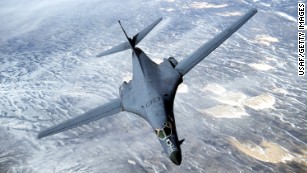
Everything you need to know about the B-1 bomber
Then came the coronavirus pandemic and a weekslong economic shutdown throughout much of China. GDP shrank 6.8% in the first quarter, the first contraction Beijing has reported since 1976.
As the economy contracted, external pressures were mounting.
The US military was boosting challenges to Beijing's claims in the South China Sea, including back-to-back naval Freedom of Navigation exercises in April and flights of B-1 bombers, the heaviest in the US Air Force inventory, originating from both Guam and the US mainland.
And when spending numbers for 2020 were announced last Friday, Beijing's priorities were immediately clear.
The military shares in the pain -- its budget increase was the lowest in decades -- but the PLA's pain was minor compared to the blows dealt to other areas of China's government.

Hong Kong police fire tear gas on pro-democracy protesters
For example, the budget was down 13.3% for general public services, down 11.8% for foreign affairs, down 7.5% for education and down 9.1% for science and technology.
"The proposed budget suggests Beijing feels insecure and under siege," said Timothy Heath, senior researcher at the RAND Corp. think tank in Washington.
"The robust spending increase reflects intense anxiety about deepening tensions with China's top competitor, the United States, as well as over the fading hopes for peaceful unification with Taiwan," Heath said.
"Beijing also has ample reason to bolster defense and security spending to manage mounting problems of domestic turmoil in Hong Kong, western provinces, or across the country as unemployment soars and growth slackens due to the effects of the Covid-19 pandemic."
Wu Qian, spokesman for the Chinese Defense Ministry, said Beijing's defense budget was appropriate for the times.
"It can be said that the world is not peaceful," Wu said on the sidelines of the National People's Congress this week.
"China's homeland security and overseas interests are also facing some real threats....
"It is reasonable and necessary that China's defense spending increased moderately and steadily," Wu said.
Comparing with the US
Beijing also touted the military budget increase as its smallest in years, and said the overall number was a fraction of the money spent by some foreign militaries.
In fact, Zhang Yesui, spokesperson for the third session of the 13th National People's Congress, told a press conference last week that "China's total defense spending in 2019 only amounted to a quarter that of the world's largest defense spender.
That largest defense spender is the United States, according to the International Institute for Strategic Studies (IISS).
IISS figures released in February show the US spent $686 billion on defense in 2019 compared with $181 billion by China, No. 2 on the IISS world rankings.
But subsequent studies by analysts at IISS and the Washington-based Heritage Foundation say the gap between the US and Chinese military budgets may be as small as 13%.
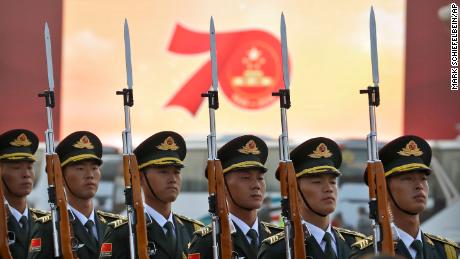
China shows off military in anniversary parade
And when you look at the advances the Chinese military has made since Xi became President in 2013, a large gap between China's and America's military budgets defies credulity:
-- In just the past few years, China has put into service its first domestically built aircraft carrier, the Shandong;
-- made its J-20 stealth fighter -- seen as a challenge to the US F-22 and F-35 fighters -- combat ready;
-- boosted its ballistic missile submarine fleet, both with new boats and better missiles inside them;
-- opened its first overseas military base in the African nation of Djibouti;
-- and built a string of islands in the South China Sea that US Adm. Philip Davidson, the top US commander in the Indo-Pacifc, called the "Great Wall of SAMs," or a string of surface-to-air missile bases could make the skies over area extremely hostile for any adversary's air forces.
Lack of transparency
All that costs a lot of money, but it Beijing's case it's often hard to see where it comes from, analysts say.
"The defense budget data available from Beijing ... suffer from three distinct problems: lack of transparency, known omissions and unreliability," Frederico Bartels, a Heritage Foundation researcher, wrote in an April paper released on The Strategist, a website of the Australian Strategic Policy Institute.
Bartels came up with the 13% difference between the US and Chinese defense budgets after analyzing everything from currency exchange rates to the cost of labor across China.
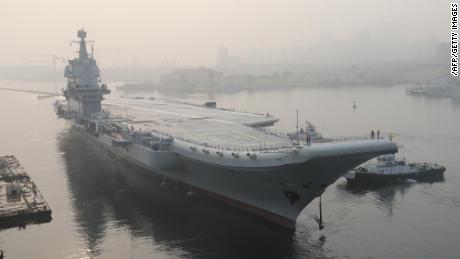
China's second aircraft carrier sets sail
He told CNN any defense figures coming out of China should be treated with skepticism because Beijing doesn't go into specifics on where money goes or under what budgets it may have been allocated.
Bartels gave the example of new aircraft carrier built in the US versus China.
In the US, the government would declare the price paid to an independent contractor to build the carrier. But in China, a state-run company would build the warship and only be answerable to Beijing.
The money for the new aircraft carrier could be transferred to the company under any one of numerous accounts, not necessarily ones related to the warship.
In the end, outside observers really can't tell what this ship costs.
"That's the type of game they can play with a state-owned enterprise," Bartels said.
Police and coast guard forces
The Heritage researcher and the IISS analysis also point out that other parts of China's defense establishment, such as its growing coast guard, are not seeing at least some of their spending included in the military budget.
According to the IISS study, the budget for the military's People's Armed Police (PAP), tasked with law enforcement, border defense and internal security, actually decreased when the large coast guard fleet came under control of the PAP in 2018.
"This would suggest that (Chinese Coast Guard) spending remains an extra-budgetary defense-related cost and should be added to total Chinese defense spending figures," the IISS study said.
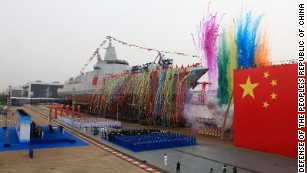
Huge new Chinese warship launches
Meanwhile, the China Power Project at the Center for Strategic and International Studies points out that annual spending figures made public by China's Finance and Defense ministries can be off by as much as $3 billion.
To put that number in hardware terms, it's roughly three of Beijing's state-of-the-art Type 55 destroyers, key linchpins in the country's naval buildup.
That buildup has been part of Xi Jinping's military modernization that aims to the make the PLA at least the equal of the United States military in Asia.
And with the progress made since Xi came to power in 2013 -- and especially since he reorganized the country's Central Military Commission and took aim at corruption in 2017 -- it's clear Beijing will not countenance any weakening of the PLA.
Bartels says the budget sends a strong message from Xi to the PLA that "we really value what the People's Liberation Army is doing, and we want to be able to shield them even in less positive economic times."
CNN's Steven Jiang and Laura He contributed to this report.

